Developing and Managing Performance at Cavendish Hall Hotel
VerifiedAdded on 2019/12/03
|27
|9134
|234
Report
AI Summary
This report provides a critical evaluation of individual performance related pay (IPRP) and its implementation at the Cavendish Hall Hotel. It examines the advantages and disadvantages of IPRP, its suitability to the hotel's business environment, and potential barriers to its effective design and implementation. The report explores how IPRP can improve organizational performance, offering recommendations on alternative reward strategies to complement or replace IPRP, along with justifications for their effectiveness. The report also delves into the importance of objective setting, strategic alignment, and feedback in enhancing employee performance, and it suggests appropriate methods for managing poor performance and supporting performance development. The analysis is supported by relevant academic literature and provides insights into improving workforce performance within the hotel sector.
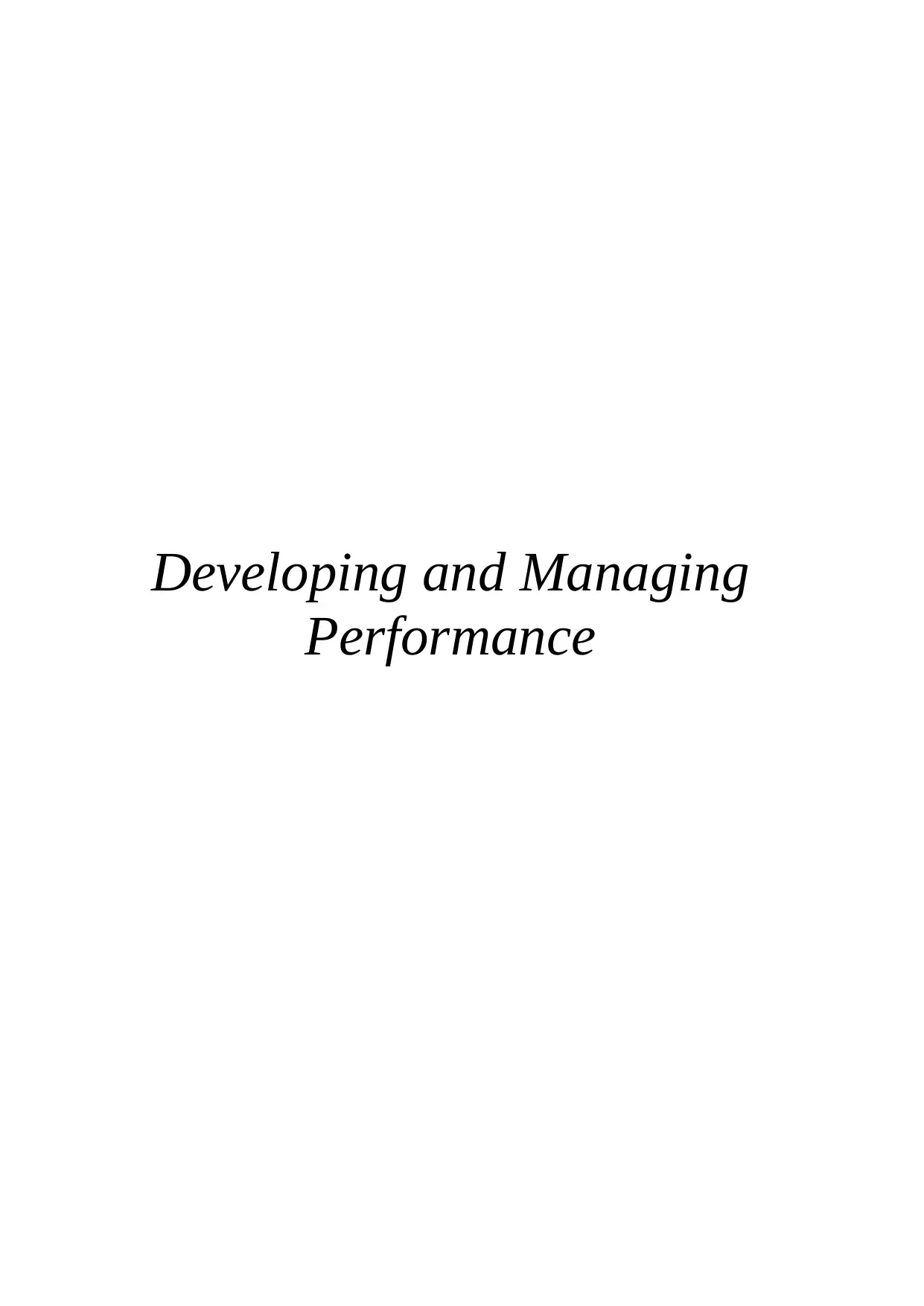
Developing and Managing
Performance
Performance
Paraphrase This Document
Need a fresh take? Get an instant paraphrase of this document with our AI Paraphraser
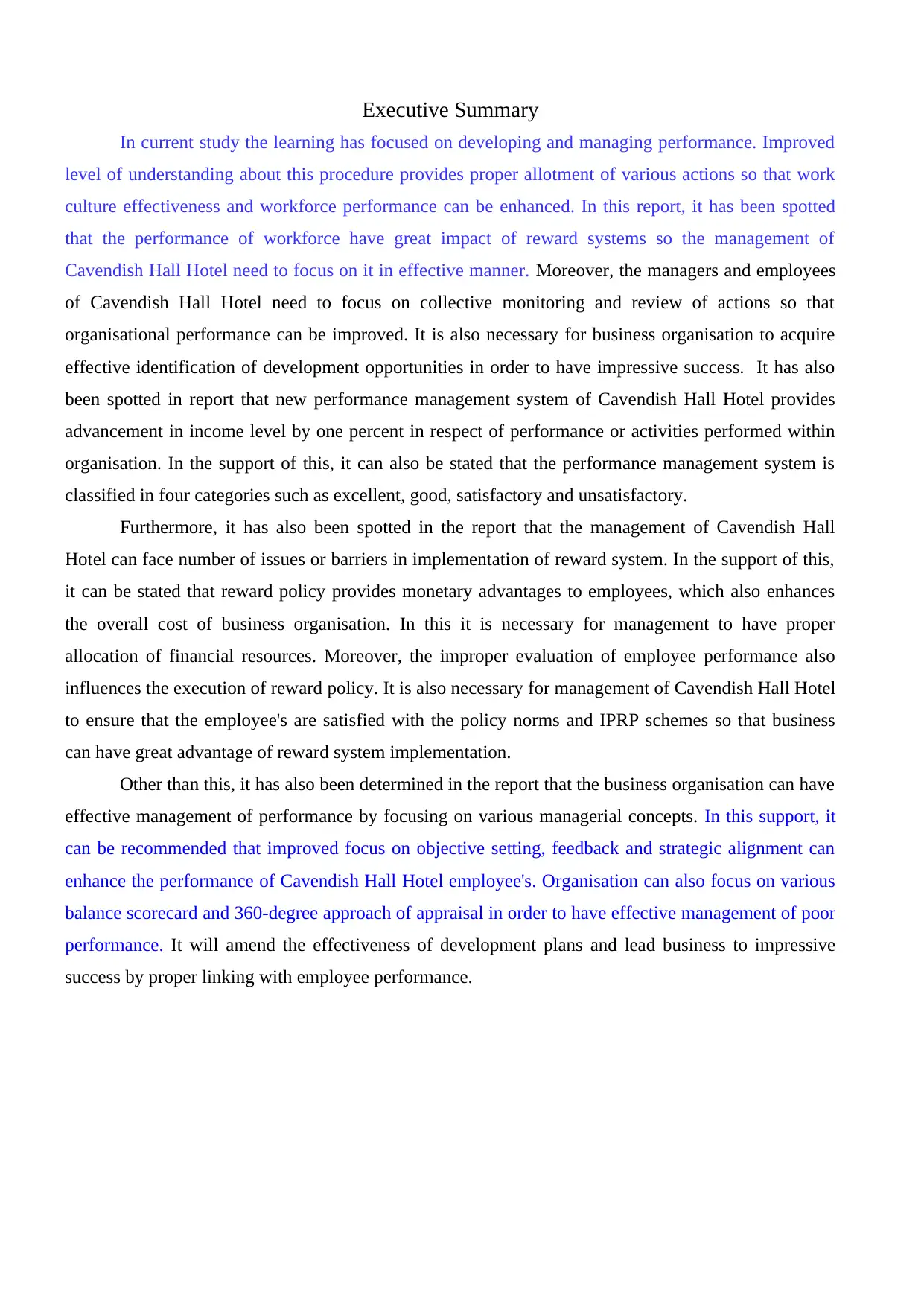
Executive Summary
In current study the learning has focused on developing and managing performance. Improved
level of understanding about this procedure provides proper allotment of various actions so that work
culture effectiveness and workforce performance can be enhanced. In this report, it has been spotted
that the performance of workforce have great impact of reward systems so the management of
Cavendish Hall Hotel need to focus on it in effective manner. Moreover, the managers and employees
of Cavendish Hall Hotel need to focus on collective monitoring and review of actions so that
organisational performance can be improved. It is also necessary for business organisation to acquire
effective identification of development opportunities in order to have impressive success. It has also
been spotted in report that new performance management system of Cavendish Hall Hotel provides
advancement in income level by one percent in respect of performance or activities performed within
organisation. In the support of this, it can also be stated that the performance management system is
classified in four categories such as excellent, good, satisfactory and unsatisfactory.
Furthermore, it has also been spotted in the report that the management of Cavendish Hall
Hotel can face number of issues or barriers in implementation of reward system. In the support of this,
it can be stated that reward policy provides monetary advantages to employees, which also enhances
the overall cost of business organisation. In this it is necessary for management to have proper
allocation of financial resources. Moreover, the improper evaluation of employee performance also
influences the execution of reward policy. It is also necessary for management of Cavendish Hall Hotel
to ensure that the employee's are satisfied with the policy norms and IPRP schemes so that business
can have great advantage of reward system implementation.
Other than this, it has also been determined in the report that the business organisation can have
effective management of performance by focusing on various managerial concepts. In this support, it
can be recommended that improved focus on objective setting, feedback and strategic alignment can
enhance the performance of Cavendish Hall Hotel employee's. Organisation can also focus on various
balance scorecard and 360-degree approach of appraisal in order to have effective management of poor
performance. It will amend the effectiveness of development plans and lead business to impressive
success by proper linking with employee performance.
In current study the learning has focused on developing and managing performance. Improved
level of understanding about this procedure provides proper allotment of various actions so that work
culture effectiveness and workforce performance can be enhanced. In this report, it has been spotted
that the performance of workforce have great impact of reward systems so the management of
Cavendish Hall Hotel need to focus on it in effective manner. Moreover, the managers and employees
of Cavendish Hall Hotel need to focus on collective monitoring and review of actions so that
organisational performance can be improved. It is also necessary for business organisation to acquire
effective identification of development opportunities in order to have impressive success. It has also
been spotted in report that new performance management system of Cavendish Hall Hotel provides
advancement in income level by one percent in respect of performance or activities performed within
organisation. In the support of this, it can also be stated that the performance management system is
classified in four categories such as excellent, good, satisfactory and unsatisfactory.
Furthermore, it has also been spotted in the report that the management of Cavendish Hall
Hotel can face number of issues or barriers in implementation of reward system. In the support of this,
it can be stated that reward policy provides monetary advantages to employees, which also enhances
the overall cost of business organisation. In this it is necessary for management to have proper
allocation of financial resources. Moreover, the improper evaluation of employee performance also
influences the execution of reward policy. It is also necessary for management of Cavendish Hall Hotel
to ensure that the employee's are satisfied with the policy norms and IPRP schemes so that business
can have great advantage of reward system implementation.
Other than this, it has also been determined in the report that the business organisation can have
effective management of performance by focusing on various managerial concepts. In this support, it
can be recommended that improved focus on objective setting, feedback and strategic alignment can
enhance the performance of Cavendish Hall Hotel employee's. Organisation can also focus on various
balance scorecard and 360-degree approach of appraisal in order to have effective management of poor
performance. It will amend the effectiveness of development plans and lead business to impressive
success by proper linking with employee performance.
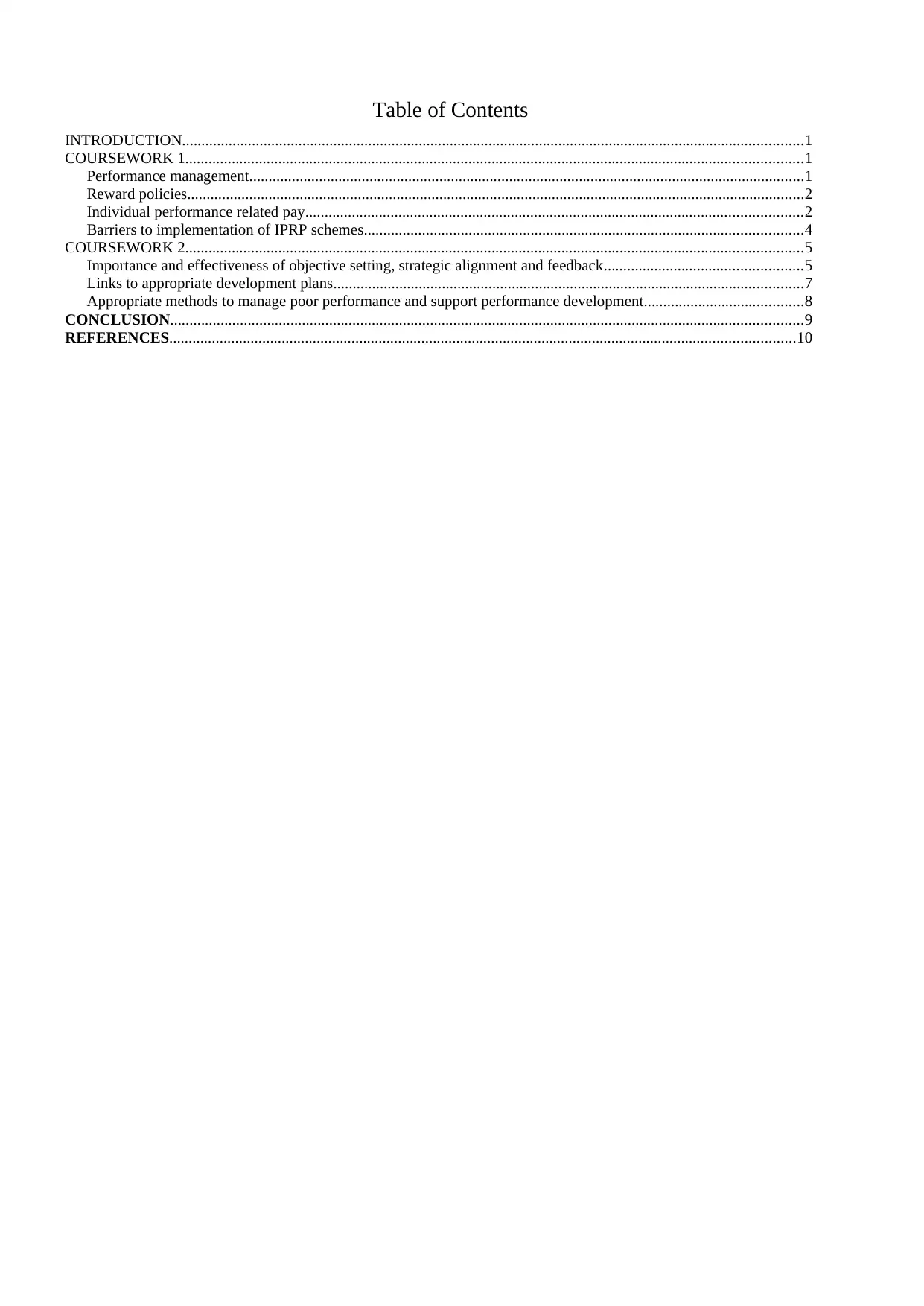
Table of Contents
INTRODUCTION................................................................................................................................................................1
COURSEWORK 1...............................................................................................................................................................1
Performance management...............................................................................................................................................1
Reward policies...............................................................................................................................................................2
Individual performance related pay................................................................................................................................2
Barriers to implementation of IPRP schemes.................................................................................................................4
COURSEWORK 2...............................................................................................................................................................5
Importance and effectiveness of objective setting, strategic alignment and feedback...................................................5
Links to appropriate development plans.........................................................................................................................7
Appropriate methods to manage poor performance and support performance development.........................................8
CONCLUSION...................................................................................................................................................................9
REFERENCES.................................................................................................................................................................10
INTRODUCTION................................................................................................................................................................1
COURSEWORK 1...............................................................................................................................................................1
Performance management...............................................................................................................................................1
Reward policies...............................................................................................................................................................2
Individual performance related pay................................................................................................................................2
Barriers to implementation of IPRP schemes.................................................................................................................4
COURSEWORK 2...............................................................................................................................................................5
Importance and effectiveness of objective setting, strategic alignment and feedback...................................................5
Links to appropriate development plans.........................................................................................................................7
Appropriate methods to manage poor performance and support performance development.........................................8
CONCLUSION...................................................................................................................................................................9
REFERENCES.................................................................................................................................................................10
⊘ This is a preview!⊘
Do you want full access?
Subscribe today to unlock all pages.

Trusted by 1+ million students worldwide
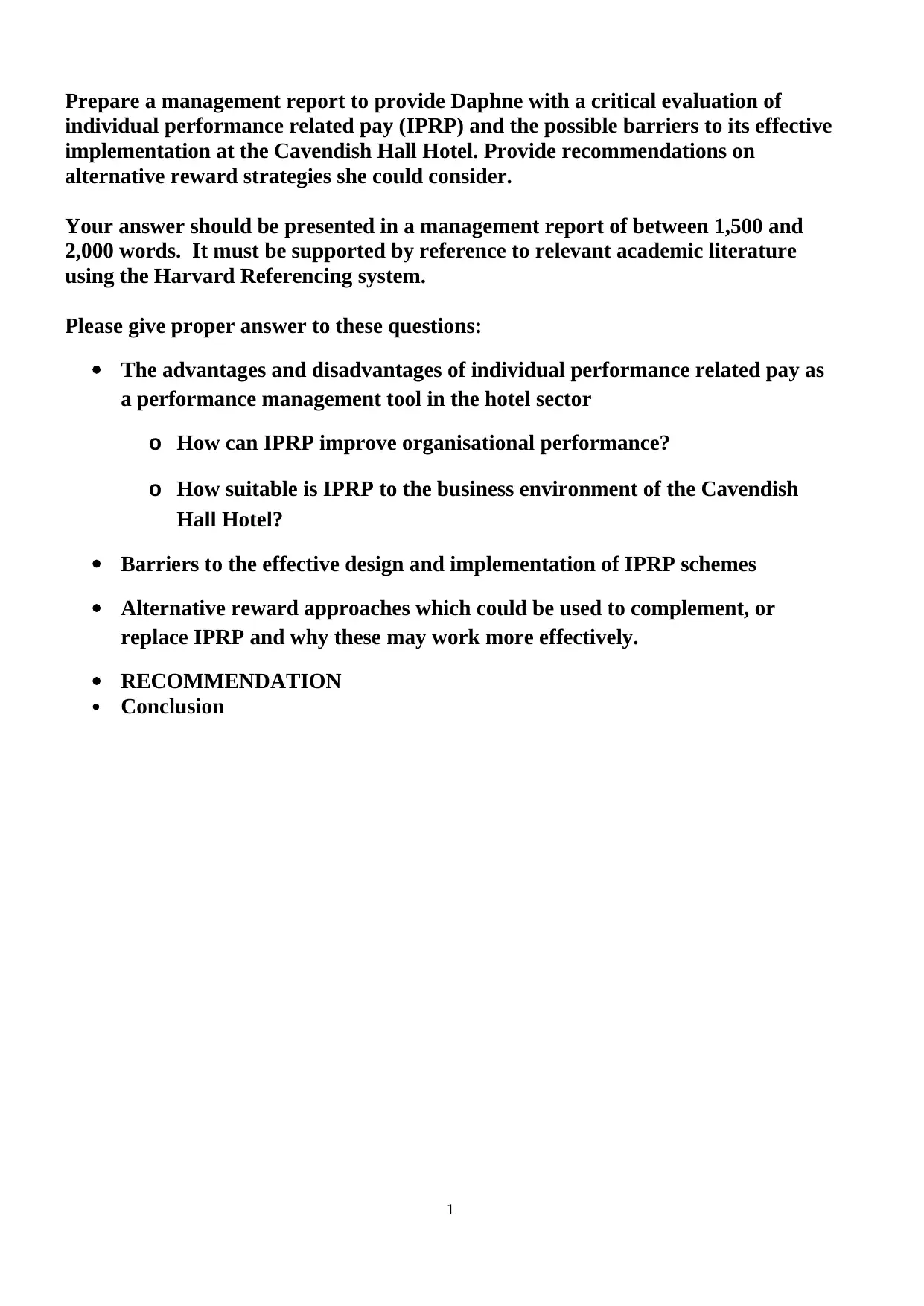
Prepare a management report to provide Daphne with a critical evaluation of
individual performance related pay (IPRP) and the possible barriers to its effective
implementation at the Cavendish Hall Hotel. Provide recommendations on
alternative reward strategies she could consider.
Your answer should be presented in a management report of between 1,500 and
2,000 words. It must be supported by reference to relevant academic literature
using the Harvard Referencing system.
Please give proper answer to these questions:
The advantages and disadvantages of individual performance related pay as
a performance management tool in the hotel sector
o How can IPRP improve organisational performance?
o How suitable is IPRP to the business environment of the Cavendish
Hall Hotel?
Barriers to the effective design and implementation of IPRP schemes
Alternative reward approaches which could be used to complement, or
replace IPRP and why these may work more effectively.
RECOMMENDATION
Conclusion
1
individual performance related pay (IPRP) and the possible barriers to its effective
implementation at the Cavendish Hall Hotel. Provide recommendations on
alternative reward strategies she could consider.
Your answer should be presented in a management report of between 1,500 and
2,000 words. It must be supported by reference to relevant academic literature
using the Harvard Referencing system.
Please give proper answer to these questions:
The advantages and disadvantages of individual performance related pay as
a performance management tool in the hotel sector
o How can IPRP improve organisational performance?
o How suitable is IPRP to the business environment of the Cavendish
Hall Hotel?
Barriers to the effective design and implementation of IPRP schemes
Alternative reward approaches which could be used to complement, or
replace IPRP and why these may work more effectively.
RECOMMENDATION
Conclusion
1
Paraphrase This Document
Need a fresh take? Get an instant paraphrase of this document with our AI Paraphraser

2
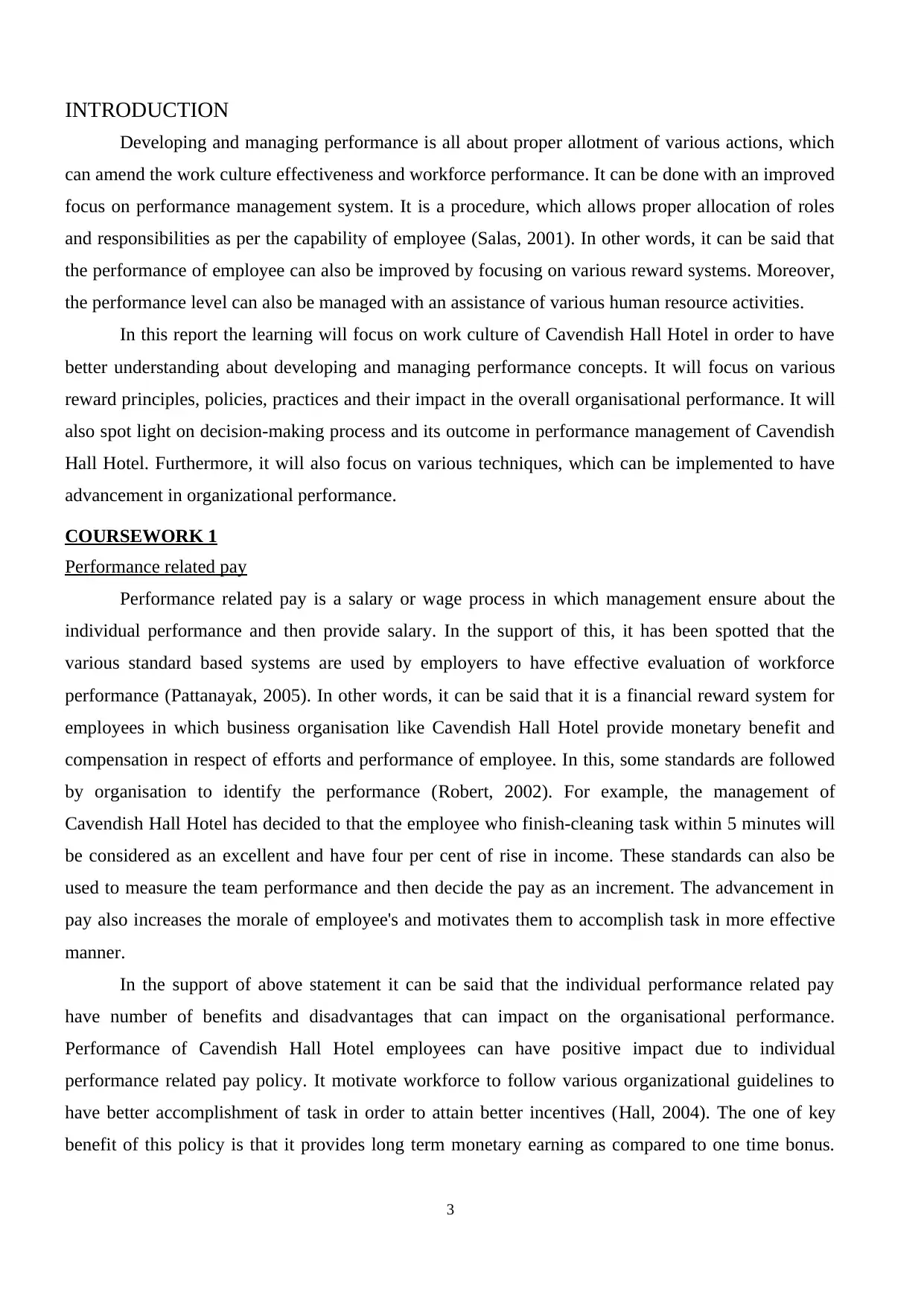
INTRODUCTION
Developing and managing performance is all about proper allotment of various actions, which
can amend the work culture effectiveness and workforce performance. It can be done with an improved
focus on performance management system. It is a procedure, which allows proper allocation of roles
and responsibilities as per the capability of employee (Salas, 2001). In other words, it can be said that
the performance of employee can also be improved by focusing on various reward systems. Moreover,
the performance level can also be managed with an assistance of various human resource activities.
In this report the learning will focus on work culture of Cavendish Hall Hotel in order to have
better understanding about developing and managing performance concepts. It will focus on various
reward principles, policies, practices and their impact in the overall organisational performance. It will
also spot light on decision-making process and its outcome in performance management of Cavendish
Hall Hotel. Furthermore, it will also focus on various techniques, which can be implemented to have
advancement in organizational performance.
COURSEWORK 1
Performance related pay
Performance related pay is a salary or wage process in which management ensure about the
individual performance and then provide salary. In the support of this, it has been spotted that the
various standard based systems are used by employers to have effective evaluation of workforce
performance (Pattanayak, 2005). In other words, it can be said that it is a financial reward system for
employees in which business organisation like Cavendish Hall Hotel provide monetary benefit and
compensation in respect of efforts and performance of employee. In this, some standards are followed
by organisation to identify the performance (Robert, 2002). For example, the management of
Cavendish Hall Hotel has decided to that the employee who finish-cleaning task within 5 minutes will
be considered as an excellent and have four per cent of rise in income. These standards can also be
used to measure the team performance and then decide the pay as an increment. The advancement in
pay also increases the morale of employee's and motivates them to accomplish task in more effective
manner.
In the support of above statement it can be said that the individual performance related pay
have number of benefits and disadvantages that can impact on the organisational performance.
Performance of Cavendish Hall Hotel employees can have positive impact due to individual
performance related pay policy. It motivate workforce to follow various organizational guidelines to
have better accomplishment of task in order to attain better incentives (Hall, 2004). The one of key
benefit of this policy is that it provides long term monetary earning as compared to one time bonus.
3
Developing and managing performance is all about proper allotment of various actions, which
can amend the work culture effectiveness and workforce performance. It can be done with an improved
focus on performance management system. It is a procedure, which allows proper allocation of roles
and responsibilities as per the capability of employee (Salas, 2001). In other words, it can be said that
the performance of employee can also be improved by focusing on various reward systems. Moreover,
the performance level can also be managed with an assistance of various human resource activities.
In this report the learning will focus on work culture of Cavendish Hall Hotel in order to have
better understanding about developing and managing performance concepts. It will focus on various
reward principles, policies, practices and their impact in the overall organisational performance. It will
also spot light on decision-making process and its outcome in performance management of Cavendish
Hall Hotel. Furthermore, it will also focus on various techniques, which can be implemented to have
advancement in organizational performance.
COURSEWORK 1
Performance related pay
Performance related pay is a salary or wage process in which management ensure about the
individual performance and then provide salary. In the support of this, it has been spotted that the
various standard based systems are used by employers to have effective evaluation of workforce
performance (Pattanayak, 2005). In other words, it can be said that it is a financial reward system for
employees in which business organisation like Cavendish Hall Hotel provide monetary benefit and
compensation in respect of efforts and performance of employee. In this, some standards are followed
by organisation to identify the performance (Robert, 2002). For example, the management of
Cavendish Hall Hotel has decided to that the employee who finish-cleaning task within 5 minutes will
be considered as an excellent and have four per cent of rise in income. These standards can also be
used to measure the team performance and then decide the pay as an increment. The advancement in
pay also increases the morale of employee's and motivates them to accomplish task in more effective
manner.
In the support of above statement it can be said that the individual performance related pay
have number of benefits and disadvantages that can impact on the organisational performance.
Performance of Cavendish Hall Hotel employees can have positive impact due to individual
performance related pay policy. It motivate workforce to follow various organizational guidelines to
have better accomplishment of task in order to attain better incentives (Hall, 2004). The one of key
benefit of this policy is that it provides long term monetary earning as compared to one time bonus.
3
⊘ This is a preview!⊘
Do you want full access?
Subscribe today to unlock all pages.

Trusted by 1+ million students worldwide
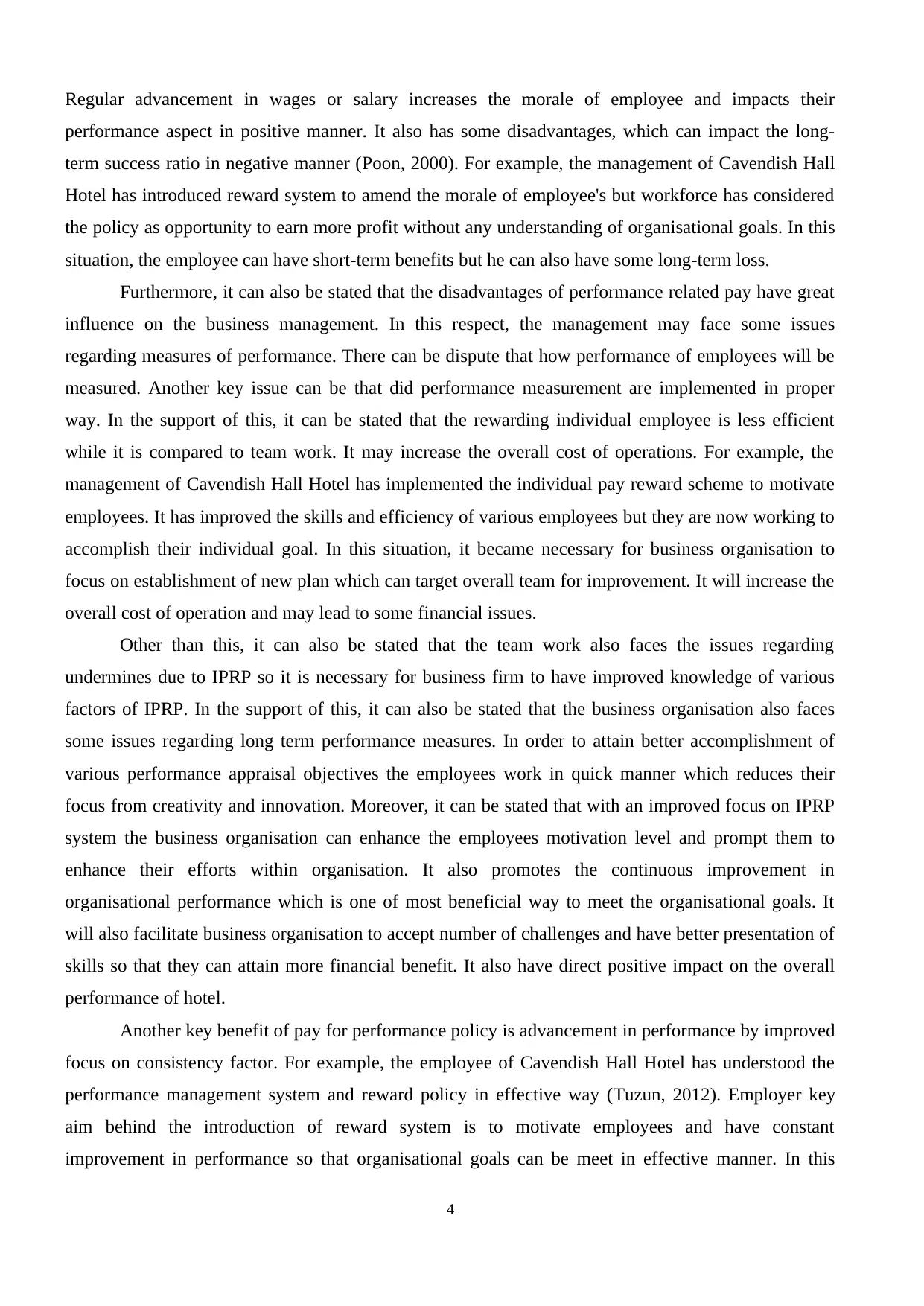
Regular advancement in wages or salary increases the morale of employee and impacts their
performance aspect in positive manner. It also has some disadvantages, which can impact the long-
term success ratio in negative manner (Poon, 2000). For example, the management of Cavendish Hall
Hotel has introduced reward system to amend the morale of employee's but workforce has considered
the policy as opportunity to earn more profit without any understanding of organisational goals. In this
situation, the employee can have short-term benefits but he can also have some long-term loss.
Furthermore, it can also be stated that the disadvantages of performance related pay have great
influence on the business management. In this respect, the management may face some issues
regarding measures of performance. There can be dispute that how performance of employees will be
measured. Another key issue can be that did performance measurement are implemented in proper
way. In the support of this, it can be stated that the rewarding individual employee is less efficient
while it is compared to team work. It may increase the overall cost of operations. For example, the
management of Cavendish Hall Hotel has implemented the individual pay reward scheme to motivate
employees. It has improved the skills and efficiency of various employees but they are now working to
accomplish their individual goal. In this situation, it became necessary for business organisation to
focus on establishment of new plan which can target overall team for improvement. It will increase the
overall cost of operation and may lead to some financial issues.
Other than this, it can also be stated that the team work also faces the issues regarding
undermines due to IPRP so it is necessary for business firm to have improved knowledge of various
factors of IPRP. In the support of this, it can also be stated that the business organisation also faces
some issues regarding long term performance measures. In order to attain better accomplishment of
various performance appraisal objectives the employees work in quick manner which reduces their
focus from creativity and innovation. Moreover, it can be stated that with an improved focus on IPRP
system the business organisation can enhance the employees motivation level and prompt them to
enhance their efforts within organisation. It also promotes the continuous improvement in
organisational performance which is one of most beneficial way to meet the organisational goals. It
will also facilitate business organisation to accept number of challenges and have better presentation of
skills so that they can attain more financial benefit. It also have direct positive impact on the overall
performance of hotel.
Another key benefit of pay for performance policy is advancement in performance by improved
focus on consistency factor. For example, the employee of Cavendish Hall Hotel has understood the
performance management system and reward policy in effective way (Tuzun, 2012). Employer key
aim behind the introduction of reward system is to motivate employees and have constant
improvement in performance so that organisational goals can be meet in effective manner. In this
4
performance aspect in positive manner. It also has some disadvantages, which can impact the long-
term success ratio in negative manner (Poon, 2000). For example, the management of Cavendish Hall
Hotel has introduced reward system to amend the morale of employee's but workforce has considered
the policy as opportunity to earn more profit without any understanding of organisational goals. In this
situation, the employee can have short-term benefits but he can also have some long-term loss.
Furthermore, it can also be stated that the disadvantages of performance related pay have great
influence on the business management. In this respect, the management may face some issues
regarding measures of performance. There can be dispute that how performance of employees will be
measured. Another key issue can be that did performance measurement are implemented in proper
way. In the support of this, it can be stated that the rewarding individual employee is less efficient
while it is compared to team work. It may increase the overall cost of operations. For example, the
management of Cavendish Hall Hotel has implemented the individual pay reward scheme to motivate
employees. It has improved the skills and efficiency of various employees but they are now working to
accomplish their individual goal. In this situation, it became necessary for business organisation to
focus on establishment of new plan which can target overall team for improvement. It will increase the
overall cost of operation and may lead to some financial issues.
Other than this, it can also be stated that the team work also faces the issues regarding
undermines due to IPRP so it is necessary for business firm to have improved knowledge of various
factors of IPRP. In the support of this, it can also be stated that the business organisation also faces
some issues regarding long term performance measures. In order to attain better accomplishment of
various performance appraisal objectives the employees work in quick manner which reduces their
focus from creativity and innovation. Moreover, it can be stated that with an improved focus on IPRP
system the business organisation can enhance the employees motivation level and prompt them to
enhance their efforts within organisation. It also promotes the continuous improvement in
organisational performance which is one of most beneficial way to meet the organisational goals. It
will also facilitate business organisation to accept number of challenges and have better presentation of
skills so that they can attain more financial benefit. It also have direct positive impact on the overall
performance of hotel.
Another key benefit of pay for performance policy is advancement in performance by improved
focus on consistency factor. For example, the employee of Cavendish Hall Hotel has understood the
performance management system and reward policy in effective way (Tuzun, 2012). Employer key
aim behind the introduction of reward system is to motivate employees and have constant
improvement in performance so that organisational goals can be meet in effective manner. In this
4
Paraphrase This Document
Need a fresh take? Get an instant paraphrase of this document with our AI Paraphraser
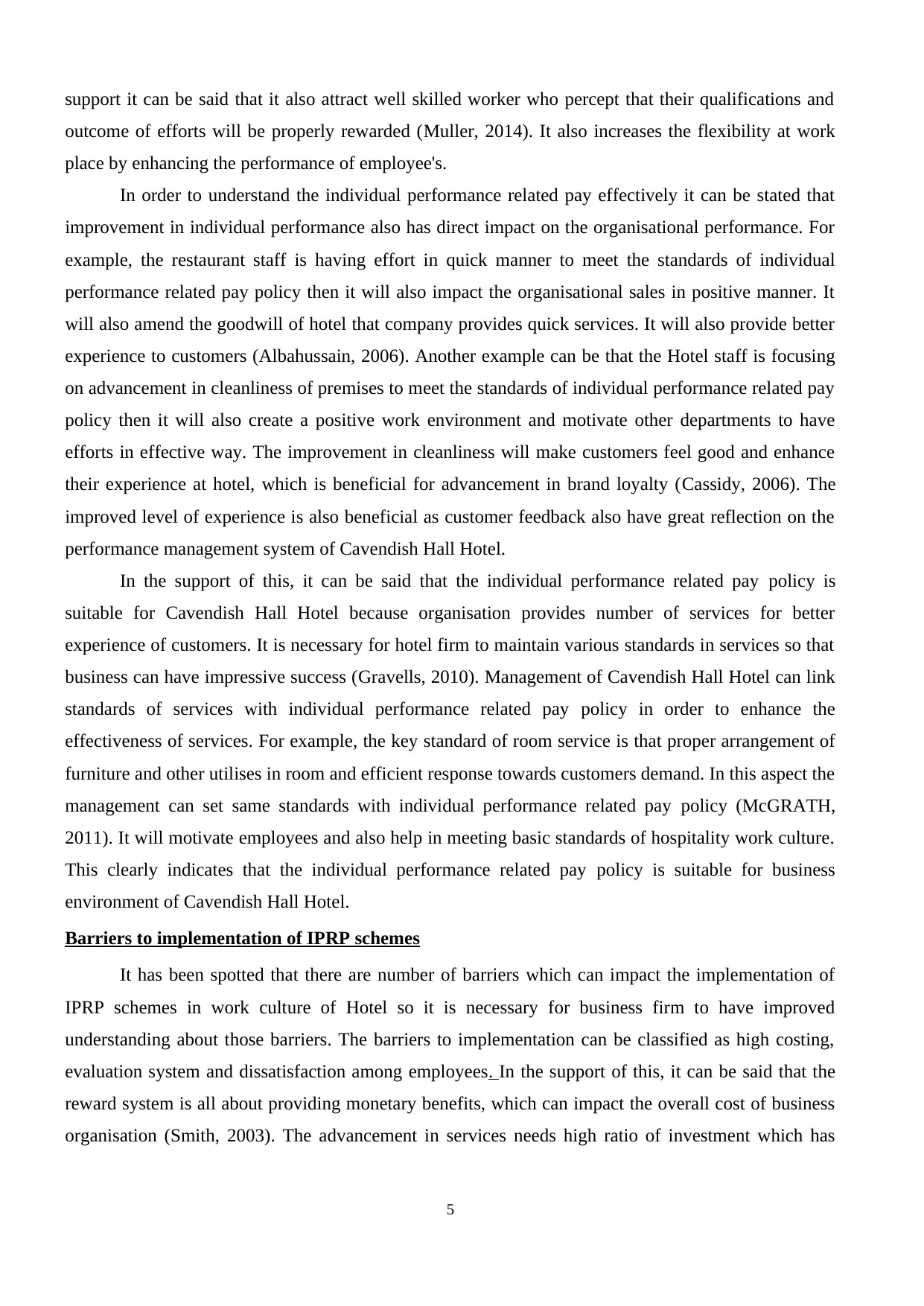
support it can be said that it also attract well skilled worker who percept that their qualifications and
outcome of efforts will be properly rewarded (Muller, 2014). It also increases the flexibility at work
place by enhancing the performance of employee's.
In order to understand the individual performance related pay effectively it can be stated that
improvement in individual performance also has direct impact on the organisational performance. For
example, the restaurant staff is having effort in quick manner to meet the standards of individual
performance related pay policy then it will also impact the organisational sales in positive manner. It
will also amend the goodwill of hotel that company provides quick services. It will also provide better
experience to customers (Albahussain, 2006). Another example can be that the Hotel staff is focusing
on advancement in cleanliness of premises to meet the standards of individual performance related pay
policy then it will also create a positive work environment and motivate other departments to have
efforts in effective way. The improvement in cleanliness will make customers feel good and enhance
their experience at hotel, which is beneficial for advancement in brand loyalty (Cassidy, 2006). The
improved level of experience is also beneficial as customer feedback also have great reflection on the
performance management system of Cavendish Hall Hotel.
In the support of this, it can be said that the individual performance related pay policy is
suitable for Cavendish Hall Hotel because organisation provides number of services for better
experience of customers. It is necessary for hotel firm to maintain various standards in services so that
business can have impressive success (Gravells, 2010). Management of Cavendish Hall Hotel can link
standards of services with individual performance related pay policy in order to enhance the
effectiveness of services. For example, the key standard of room service is that proper arrangement of
furniture and other utilises in room and efficient response towards customers demand. In this aspect the
management can set same standards with individual performance related pay policy (McGRATH,
2011). It will motivate employees and also help in meeting basic standards of hospitality work culture.
This clearly indicates that the individual performance related pay policy is suitable for business
environment of Cavendish Hall Hotel.
Barriers to implementation of IPRP schemes
It has been spotted that there are number of barriers which can impact the implementation of
IPRP schemes in work culture of Hotel so it is necessary for business firm to have improved
understanding about those barriers. The barriers to implementation can be classified as high costing,
evaluation system and dissatisfaction among employees. In the support of this, it can be said that the
reward system is all about providing monetary benefits, which can impact the overall cost of business
organisation (Smith, 2003). The advancement in services needs high ratio of investment which has
5
outcome of efforts will be properly rewarded (Muller, 2014). It also increases the flexibility at work
place by enhancing the performance of employee's.
In order to understand the individual performance related pay effectively it can be stated that
improvement in individual performance also has direct impact on the organisational performance. For
example, the restaurant staff is having effort in quick manner to meet the standards of individual
performance related pay policy then it will also impact the organisational sales in positive manner. It
will also amend the goodwill of hotel that company provides quick services. It will also provide better
experience to customers (Albahussain, 2006). Another example can be that the Hotel staff is focusing
on advancement in cleanliness of premises to meet the standards of individual performance related pay
policy then it will also create a positive work environment and motivate other departments to have
efforts in effective way. The improvement in cleanliness will make customers feel good and enhance
their experience at hotel, which is beneficial for advancement in brand loyalty (Cassidy, 2006). The
improved level of experience is also beneficial as customer feedback also have great reflection on the
performance management system of Cavendish Hall Hotel.
In the support of this, it can be said that the individual performance related pay policy is
suitable for Cavendish Hall Hotel because organisation provides number of services for better
experience of customers. It is necessary for hotel firm to maintain various standards in services so that
business can have impressive success (Gravells, 2010). Management of Cavendish Hall Hotel can link
standards of services with individual performance related pay policy in order to enhance the
effectiveness of services. For example, the key standard of room service is that proper arrangement of
furniture and other utilises in room and efficient response towards customers demand. In this aspect the
management can set same standards with individual performance related pay policy (McGRATH,
2011). It will motivate employees and also help in meeting basic standards of hospitality work culture.
This clearly indicates that the individual performance related pay policy is suitable for business
environment of Cavendish Hall Hotel.
Barriers to implementation of IPRP schemes
It has been spotted that there are number of barriers which can impact the implementation of
IPRP schemes in work culture of Hotel so it is necessary for business firm to have improved
understanding about those barriers. The barriers to implementation can be classified as high costing,
evaluation system and dissatisfaction among employees. In the support of this, it can be said that the
reward system is all about providing monetary benefits, which can impact the overall cost of business
organisation (Smith, 2003). The advancement in services needs high ratio of investment which has
5
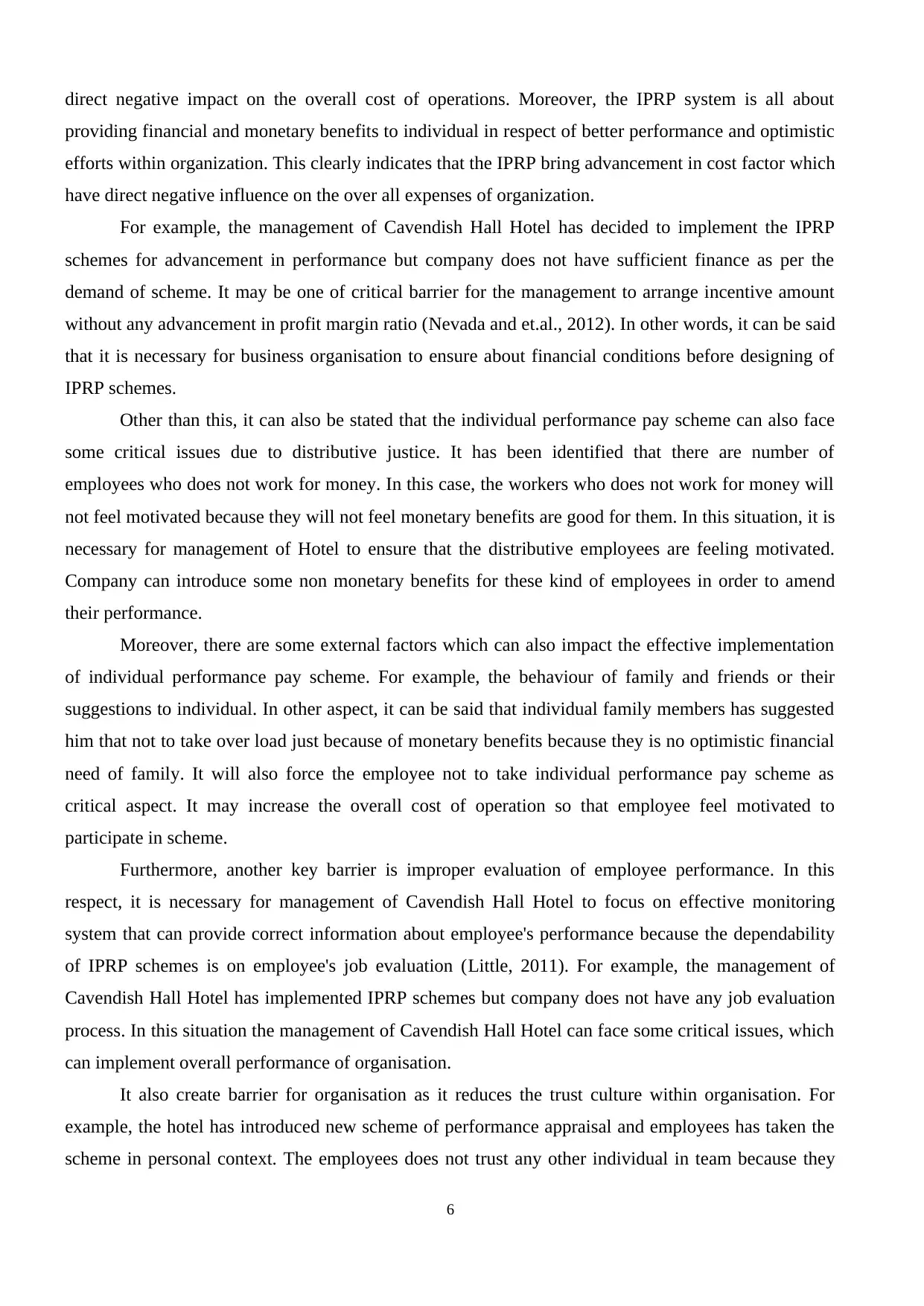
direct negative impact on the overall cost of operations. Moreover, the IPRP system is all about
providing financial and monetary benefits to individual in respect of better performance and optimistic
efforts within organization. This clearly indicates that the IPRP bring advancement in cost factor which
have direct negative influence on the over all expenses of organization.
For example, the management of Cavendish Hall Hotel has decided to implement the IPRP
schemes for advancement in performance but company does not have sufficient finance as per the
demand of scheme. It may be one of critical barrier for the management to arrange incentive amount
without any advancement in profit margin ratio (Nevada and et.al., 2012). In other words, it can be said
that it is necessary for business organisation to ensure about financial conditions before designing of
IPRP schemes.
Other than this, it can also be stated that the individual performance pay scheme can also face
some critical issues due to distributive justice. It has been identified that there are number of
employees who does not work for money. In this case, the workers who does not work for money will
not feel motivated because they will not feel monetary benefits are good for them. In this situation, it is
necessary for management of Hotel to ensure that the distributive employees are feeling motivated.
Company can introduce some non monetary benefits for these kind of employees in order to amend
their performance.
Moreover, there are some external factors which can also impact the effective implementation
of individual performance pay scheme. For example, the behaviour of family and friends or their
suggestions to individual. In other aspect, it can be said that individual family members has suggested
him that not to take over load just because of monetary benefits because they is no optimistic financial
need of family. It will also force the employee not to take individual performance pay scheme as
critical aspect. It may increase the overall cost of operation so that employee feel motivated to
participate in scheme.
Furthermore, another key barrier is improper evaluation of employee performance. In this
respect, it is necessary for management of Cavendish Hall Hotel to focus on effective monitoring
system that can provide correct information about employee's performance because the dependability
of IPRP schemes is on employee's job evaluation (Little, 2011). For example, the management of
Cavendish Hall Hotel has implemented IPRP schemes but company does not have any job evaluation
process. In this situation the management of Cavendish Hall Hotel can face some critical issues, which
can implement overall performance of organisation.
It also create barrier for organisation as it reduces the trust culture within organisation. For
example, the hotel has introduced new scheme of performance appraisal and employees has taken the
scheme in personal context. The employees does not trust any other individual in team because they
6
providing financial and monetary benefits to individual in respect of better performance and optimistic
efforts within organization. This clearly indicates that the IPRP bring advancement in cost factor which
have direct negative influence on the over all expenses of organization.
For example, the management of Cavendish Hall Hotel has decided to implement the IPRP
schemes for advancement in performance but company does not have sufficient finance as per the
demand of scheme. It may be one of critical barrier for the management to arrange incentive amount
without any advancement in profit margin ratio (Nevada and et.al., 2012). In other words, it can be said
that it is necessary for business organisation to ensure about financial conditions before designing of
IPRP schemes.
Other than this, it can also be stated that the individual performance pay scheme can also face
some critical issues due to distributive justice. It has been identified that there are number of
employees who does not work for money. In this case, the workers who does not work for money will
not feel motivated because they will not feel monetary benefits are good for them. In this situation, it is
necessary for management of Hotel to ensure that the distributive employees are feeling motivated.
Company can introduce some non monetary benefits for these kind of employees in order to amend
their performance.
Moreover, there are some external factors which can also impact the effective implementation
of individual performance pay scheme. For example, the behaviour of family and friends or their
suggestions to individual. In other aspect, it can be said that individual family members has suggested
him that not to take over load just because of monetary benefits because they is no optimistic financial
need of family. It will also force the employee not to take individual performance pay scheme as
critical aspect. It may increase the overall cost of operation so that employee feel motivated to
participate in scheme.
Furthermore, another key barrier is improper evaluation of employee performance. In this
respect, it is necessary for management of Cavendish Hall Hotel to focus on effective monitoring
system that can provide correct information about employee's performance because the dependability
of IPRP schemes is on employee's job evaluation (Little, 2011). For example, the management of
Cavendish Hall Hotel has implemented IPRP schemes but company does not have any job evaluation
process. In this situation the management of Cavendish Hall Hotel can face some critical issues, which
can implement overall performance of organisation.
It also create barrier for organisation as it reduces the trust culture within organisation. For
example, the hotel has introduced new scheme of performance appraisal and employees has taken the
scheme in personal context. The employees does not trust any other individual in team because they
6
⊘ This is a preview!⊘
Do you want full access?
Subscribe today to unlock all pages.

Trusted by 1+ million students worldwide
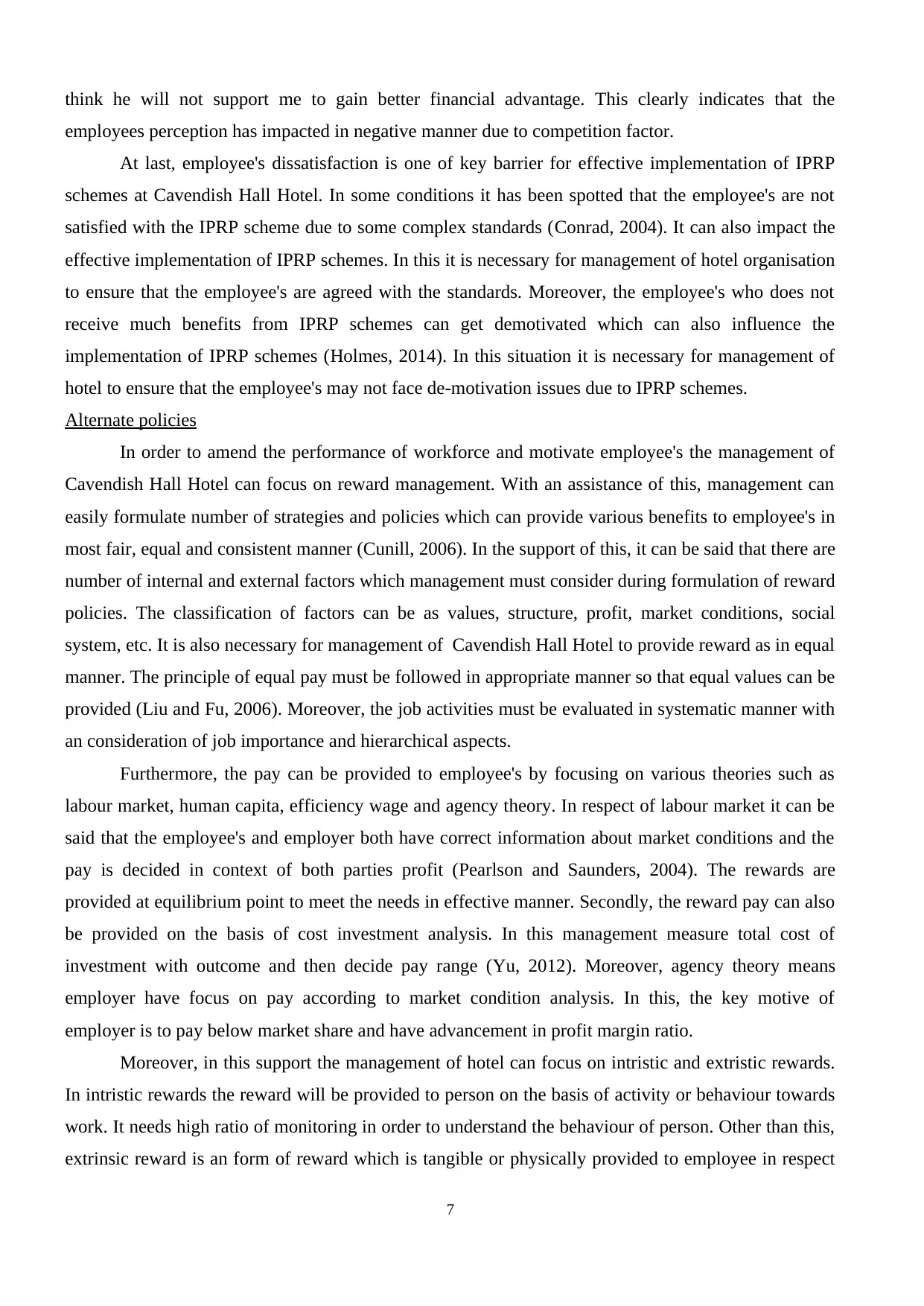
think he will not support me to gain better financial advantage. This clearly indicates that the
employees perception has impacted in negative manner due to competition factor.
At last, employee's dissatisfaction is one of key barrier for effective implementation of IPRP
schemes at Cavendish Hall Hotel. In some conditions it has been spotted that the employee's are not
satisfied with the IPRP scheme due to some complex standards (Conrad, 2004). It can also impact the
effective implementation of IPRP schemes. In this it is necessary for management of hotel organisation
to ensure that the employee's are agreed with the standards. Moreover, the employee's who does not
receive much benefits from IPRP schemes can get demotivated which can also influence the
implementation of IPRP schemes (Holmes, 2014). In this situation it is necessary for management of
hotel to ensure that the employee's may not face de-motivation issues due to IPRP schemes.
Alternate policies
In order to amend the performance of workforce and motivate employee's the management of
Cavendish Hall Hotel can focus on reward management. With an assistance of this, management can
easily formulate number of strategies and policies which can provide various benefits to employee's in
most fair, equal and consistent manner (Cunill, 2006). In the support of this, it can be said that there are
number of internal and external factors which management must consider during formulation of reward
policies. The classification of factors can be as values, structure, profit, market conditions, social
system, etc. It is also necessary for management of Cavendish Hall Hotel to provide reward as in equal
manner. The principle of equal pay must be followed in appropriate manner so that equal values can be
provided (Liu and Fu, 2006). Moreover, the job activities must be evaluated in systematic manner with
an consideration of job importance and hierarchical aspects.
Furthermore, the pay can be provided to employee's by focusing on various theories such as
labour market, human capita, efficiency wage and agency theory. In respect of labour market it can be
said that the employee's and employer both have correct information about market conditions and the
pay is decided in context of both parties profit (Pearlson and Saunders, 2004). The rewards are
provided at equilibrium point to meet the needs in effective manner. Secondly, the reward pay can also
be provided on the basis of cost investment analysis. In this management measure total cost of
investment with outcome and then decide pay range (Yu, 2012). Moreover, agency theory means
employer have focus on pay according to market condition analysis. In this, the key motive of
employer is to pay below market share and have advancement in profit margin ratio.
Moreover, in this support the management of hotel can focus on intristic and extristic rewards.
In intristic rewards the reward will be provided to person on the basis of activity or behaviour towards
work. It needs high ratio of monitoring in order to understand the behaviour of person. Other than this,
extrinsic reward is an form of reward which is tangible or physically provided to employee in respect
7
employees perception has impacted in negative manner due to competition factor.
At last, employee's dissatisfaction is one of key barrier for effective implementation of IPRP
schemes at Cavendish Hall Hotel. In some conditions it has been spotted that the employee's are not
satisfied with the IPRP scheme due to some complex standards (Conrad, 2004). It can also impact the
effective implementation of IPRP schemes. In this it is necessary for management of hotel organisation
to ensure that the employee's are agreed with the standards. Moreover, the employee's who does not
receive much benefits from IPRP schemes can get demotivated which can also influence the
implementation of IPRP schemes (Holmes, 2014). In this situation it is necessary for management of
hotel to ensure that the employee's may not face de-motivation issues due to IPRP schemes.
Alternate policies
In order to amend the performance of workforce and motivate employee's the management of
Cavendish Hall Hotel can focus on reward management. With an assistance of this, management can
easily formulate number of strategies and policies which can provide various benefits to employee's in
most fair, equal and consistent manner (Cunill, 2006). In the support of this, it can be said that there are
number of internal and external factors which management must consider during formulation of reward
policies. The classification of factors can be as values, structure, profit, market conditions, social
system, etc. It is also necessary for management of Cavendish Hall Hotel to provide reward as in equal
manner. The principle of equal pay must be followed in appropriate manner so that equal values can be
provided (Liu and Fu, 2006). Moreover, the job activities must be evaluated in systematic manner with
an consideration of job importance and hierarchical aspects.
Furthermore, the pay can be provided to employee's by focusing on various theories such as
labour market, human capita, efficiency wage and agency theory. In respect of labour market it can be
said that the employee's and employer both have correct information about market conditions and the
pay is decided in context of both parties profit (Pearlson and Saunders, 2004). The rewards are
provided at equilibrium point to meet the needs in effective manner. Secondly, the reward pay can also
be provided on the basis of cost investment analysis. In this management measure total cost of
investment with outcome and then decide pay range (Yu, 2012). Moreover, agency theory means
employer have focus on pay according to market condition analysis. In this, the key motive of
employer is to pay below market share and have advancement in profit margin ratio.
Moreover, in this support the management of hotel can focus on intristic and extristic rewards.
In intristic rewards the reward will be provided to person on the basis of activity or behaviour towards
work. It needs high ratio of monitoring in order to understand the behaviour of person. Other than this,
extrinsic reward is an form of reward which is tangible or physically provided to employee in respect
7
Paraphrase This Document
Need a fresh take? Get an instant paraphrase of this document with our AI Paraphraser
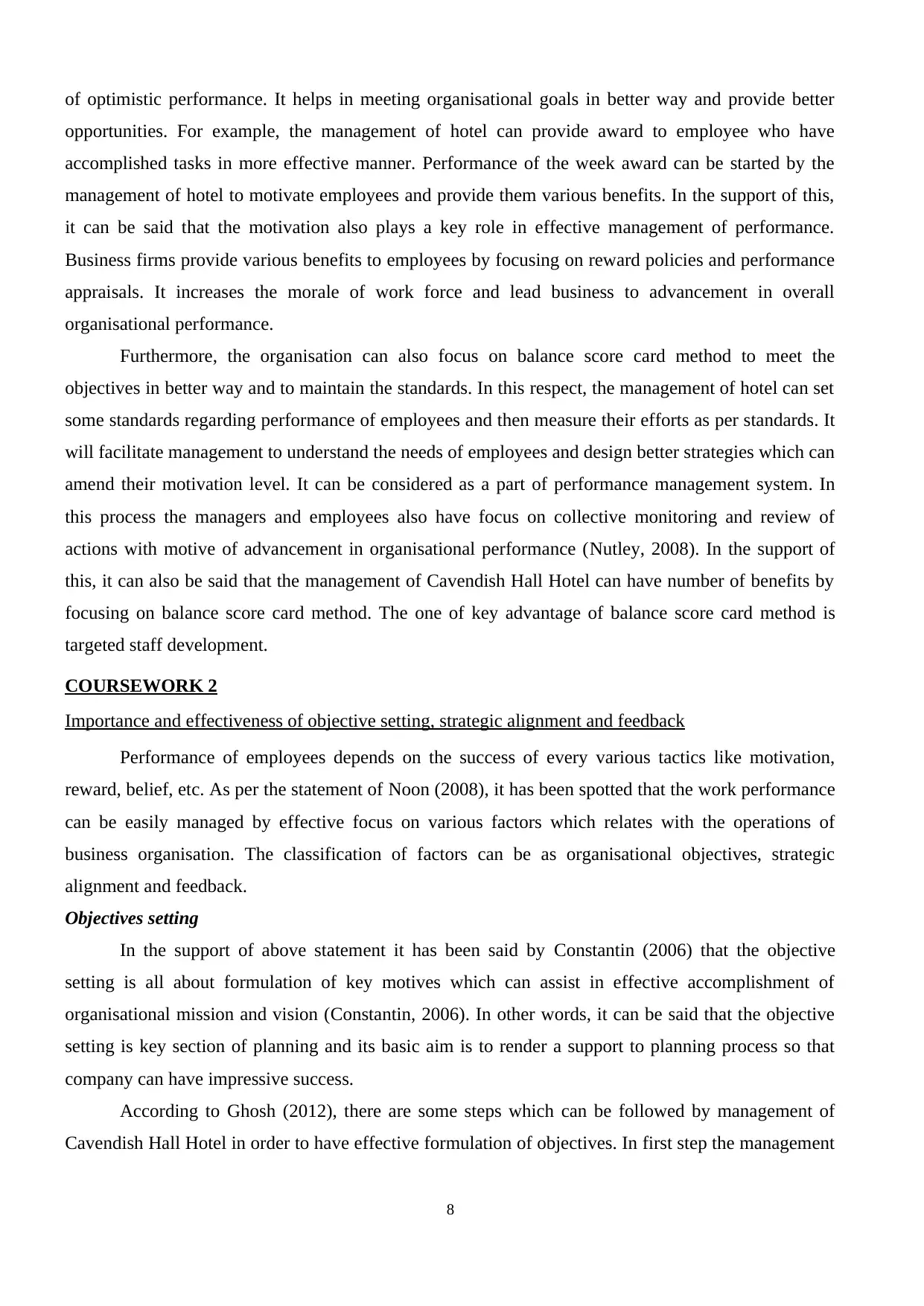
of optimistic performance. It helps in meeting organisational goals in better way and provide better
opportunities. For example, the management of hotel can provide award to employee who have
accomplished tasks in more effective manner. Performance of the week award can be started by the
management of hotel to motivate employees and provide them various benefits. In the support of this,
it can be said that the motivation also plays a key role in effective management of performance.
Business firms provide various benefits to employees by focusing on reward policies and performance
appraisals. It increases the morale of work force and lead business to advancement in overall
organisational performance.
Furthermore, the organisation can also focus on balance score card method to meet the
objectives in better way and to maintain the standards. In this respect, the management of hotel can set
some standards regarding performance of employees and then measure their efforts as per standards. It
will facilitate management to understand the needs of employees and design better strategies which can
amend their motivation level. It can be considered as a part of performance management system. In
this process the managers and employees also have focus on collective monitoring and review of
actions with motive of advancement in organisational performance (Nutley, 2008). In the support of
this, it can also be said that the management of Cavendish Hall Hotel can have number of benefits by
focusing on balance score card method. The one of key advantage of balance score card method is
targeted staff development.
COURSEWORK 2
Importance and effectiveness of objective setting, strategic alignment and feedback
Performance of employees depends on the success of every various tactics like motivation,
reward, belief, etc. As per the statement of Noon (2008), it has been spotted that the work performance
can be easily managed by effective focus on various factors which relates with the operations of
business organisation. The classification of factors can be as organisational objectives, strategic
alignment and feedback.
Objectives setting
In the support of above statement it has been said by Constantin (2006) that the objective
setting is all about formulation of key motives which can assist in effective accomplishment of
organisational mission and vision (Constantin, 2006). In other words, it can be said that the objective
setting is key section of planning and its basic aim is to render a support to planning process so that
company can have impressive success.
According to Ghosh (2012), there are some steps which can be followed by management of
Cavendish Hall Hotel in order to have effective formulation of objectives. In first step the management
8
opportunities. For example, the management of hotel can provide award to employee who have
accomplished tasks in more effective manner. Performance of the week award can be started by the
management of hotel to motivate employees and provide them various benefits. In the support of this,
it can be said that the motivation also plays a key role in effective management of performance.
Business firms provide various benefits to employees by focusing on reward policies and performance
appraisals. It increases the morale of work force and lead business to advancement in overall
organisational performance.
Furthermore, the organisation can also focus on balance score card method to meet the
objectives in better way and to maintain the standards. In this respect, the management of hotel can set
some standards regarding performance of employees and then measure their efforts as per standards. It
will facilitate management to understand the needs of employees and design better strategies which can
amend their motivation level. It can be considered as a part of performance management system. In
this process the managers and employees also have focus on collective monitoring and review of
actions with motive of advancement in organisational performance (Nutley, 2008). In the support of
this, it can also be said that the management of Cavendish Hall Hotel can have number of benefits by
focusing on balance score card method. The one of key advantage of balance score card method is
targeted staff development.
COURSEWORK 2
Importance and effectiveness of objective setting, strategic alignment and feedback
Performance of employees depends on the success of every various tactics like motivation,
reward, belief, etc. As per the statement of Noon (2008), it has been spotted that the work performance
can be easily managed by effective focus on various factors which relates with the operations of
business organisation. The classification of factors can be as organisational objectives, strategic
alignment and feedback.
Objectives setting
In the support of above statement it has been said by Constantin (2006) that the objective
setting is all about formulation of key motives which can assist in effective accomplishment of
organisational mission and vision (Constantin, 2006). In other words, it can be said that the objective
setting is key section of planning and its basic aim is to render a support to planning process so that
company can have impressive success.
According to Ghosh (2012), there are some steps which can be followed by management of
Cavendish Hall Hotel in order to have effective formulation of objectives. In first step the management
8
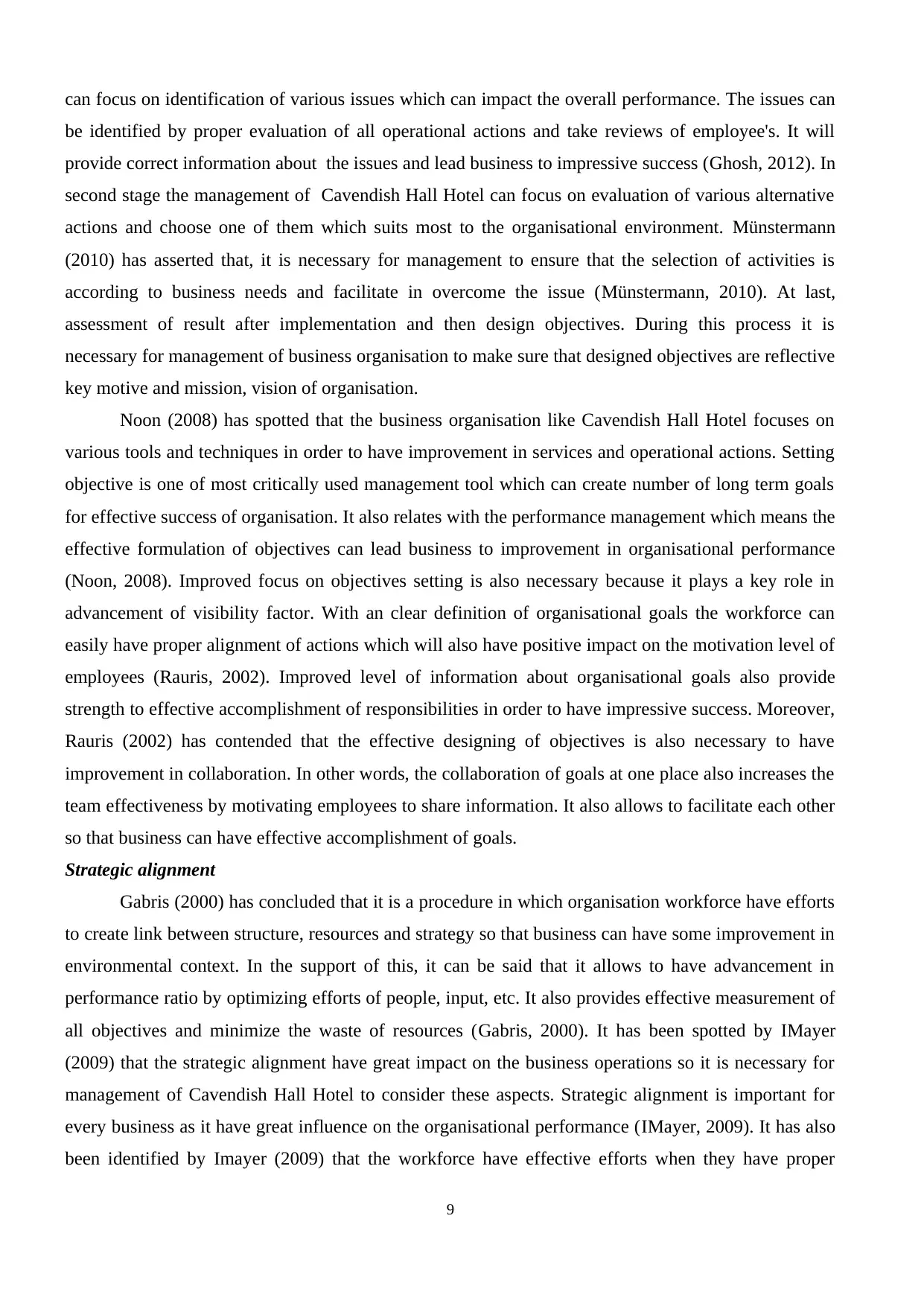
can focus on identification of various issues which can impact the overall performance. The issues can
be identified by proper evaluation of all operational actions and take reviews of employee's. It will
provide correct information about the issues and lead business to impressive success (Ghosh, 2012). In
second stage the management of Cavendish Hall Hotel can focus on evaluation of various alternative
actions and choose one of them which suits most to the organisational environment. Münstermann
(2010) has asserted that, it is necessary for management to ensure that the selection of activities is
according to business needs and facilitate in overcome the issue (Münstermann, 2010). At last,
assessment of result after implementation and then design objectives. During this process it is
necessary for management of business organisation to make sure that designed objectives are reflective
key motive and mission, vision of organisation.
Noon (2008) has spotted that the business organisation like Cavendish Hall Hotel focuses on
various tools and techniques in order to have improvement in services and operational actions. Setting
objective is one of most critically used management tool which can create number of long term goals
for effective success of organisation. It also relates with the performance management which means the
effective formulation of objectives can lead business to improvement in organisational performance
(Noon, 2008). Improved focus on objectives setting is also necessary because it plays a key role in
advancement of visibility factor. With an clear definition of organisational goals the workforce can
easily have proper alignment of actions which will also have positive impact on the motivation level of
employees (Rauris, 2002). Improved level of information about organisational goals also provide
strength to effective accomplishment of responsibilities in order to have impressive success. Moreover,
Rauris (2002) has contended that the effective designing of objectives is also necessary to have
improvement in collaboration. In other words, the collaboration of goals at one place also increases the
team effectiveness by motivating employees to share information. It also allows to facilitate each other
so that business can have effective accomplishment of goals.
Strategic alignment
Gabris (2000) has concluded that it is a procedure in which organisation workforce have efforts
to create link between structure, resources and strategy so that business can have some improvement in
environmental context. In the support of this, it can be said that it allows to have advancement in
performance ratio by optimizing efforts of people, input, etc. It also provides effective measurement of
all objectives and minimize the waste of resources (Gabris, 2000). It has been spotted by IMayer
(2009) that the strategic alignment have great impact on the business operations so it is necessary for
management of Cavendish Hall Hotel to consider these aspects. Strategic alignment is important for
every business as it have great influence on the organisational performance (IMayer, 2009). It has also
been identified by Imayer (2009) that the workforce have effective efforts when they have proper
9
be identified by proper evaluation of all operational actions and take reviews of employee's. It will
provide correct information about the issues and lead business to impressive success (Ghosh, 2012). In
second stage the management of Cavendish Hall Hotel can focus on evaluation of various alternative
actions and choose one of them which suits most to the organisational environment. Münstermann
(2010) has asserted that, it is necessary for management to ensure that the selection of activities is
according to business needs and facilitate in overcome the issue (Münstermann, 2010). At last,
assessment of result after implementation and then design objectives. During this process it is
necessary for management of business organisation to make sure that designed objectives are reflective
key motive and mission, vision of organisation.
Noon (2008) has spotted that the business organisation like Cavendish Hall Hotel focuses on
various tools and techniques in order to have improvement in services and operational actions. Setting
objective is one of most critically used management tool which can create number of long term goals
for effective success of organisation. It also relates with the performance management which means the
effective formulation of objectives can lead business to improvement in organisational performance
(Noon, 2008). Improved focus on objectives setting is also necessary because it plays a key role in
advancement of visibility factor. With an clear definition of organisational goals the workforce can
easily have proper alignment of actions which will also have positive impact on the motivation level of
employees (Rauris, 2002). Improved level of information about organisational goals also provide
strength to effective accomplishment of responsibilities in order to have impressive success. Moreover,
Rauris (2002) has contended that the effective designing of objectives is also necessary to have
improvement in collaboration. In other words, the collaboration of goals at one place also increases the
team effectiveness by motivating employees to share information. It also allows to facilitate each other
so that business can have effective accomplishment of goals.
Strategic alignment
Gabris (2000) has concluded that it is a procedure in which organisation workforce have efforts
to create link between structure, resources and strategy so that business can have some improvement in
environmental context. In the support of this, it can be said that it allows to have advancement in
performance ratio by optimizing efforts of people, input, etc. It also provides effective measurement of
all objectives and minimize the waste of resources (Gabris, 2000). It has been spotted by IMayer
(2009) that the strategic alignment have great impact on the business operations so it is necessary for
management of Cavendish Hall Hotel to consider these aspects. Strategic alignment is important for
every business as it have great influence on the organisational performance (IMayer, 2009). It has also
been identified by Imayer (2009) that the workforce have effective efforts when they have proper
9
⊘ This is a preview!⊘
Do you want full access?
Subscribe today to unlock all pages.

Trusted by 1+ million students worldwide
1 out of 27
Related Documents
Your All-in-One AI-Powered Toolkit for Academic Success.
+13062052269
info@desklib.com
Available 24*7 on WhatsApp / Email
![[object Object]](/_next/static/media/star-bottom.7253800d.svg)
Unlock your academic potential
Copyright © 2020–2026 A2Z Services. All Rights Reserved. Developed and managed by ZUCOL.





